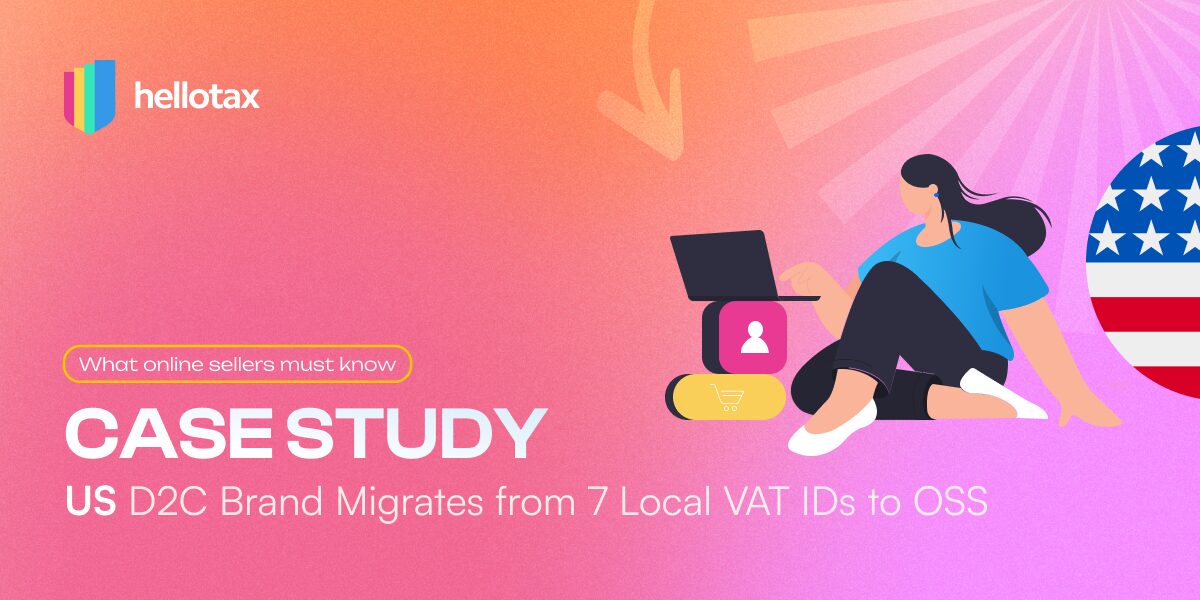Belgium is a good market for e-commerce due to several factors. Firstly, it has a high internet penetration rate and a tech-savvy population, which makes online shopping very popular. Additionally, Belgium is strategically located in the heart of Europe, which allows businesses to easily reach customers in other European countries. The country also has a strong logistics infrastructure, which is essential for efficient and cost-effective delivery of goods. Here are the most important facts about VAT registration in Belgium you should know.
Maria
Last Updated on 28 October 2025

Who has to register for VAT in Belgium?
Previously, a VAT registration was necessary when a business reached the country-specific threshold of 35,000 euros for distance selling. However, as of July 2021, the country-specific threshold was abolished and a new EU-wide threshold of 10,000 EU was implemented.
In addition to this threshold, Belgian businesses must register for VAT if they supply goods or services, regardless of the frequency or independence of the supply, or whether it is the main or secondary activity of the business, and if the business needs to account for Belgian VAT on intra-community acquisitions of goods or on intra-community supplies of services. Exempt businesses are not required to register, but non-Belgian companies must register for VAT if they carry out transactions in Belgium on which they must pay VAT and are granted a right of deduction.
💡 If you’re only making cross-border B2C sales of goods from one EU country to others and you are registered for the OSS scheme, you may not need a local VAT registration in Belgium. However, if you store goods in Belgium (e.g., via Amazon FBA) or sell to Belgian customers from within the country, registration is mandatory.
What information is required for a VAT registration in Belgium?
To obtain a Belgian VAT number, the following supporting information is required:
- VAT certificate to prove the business is registered for VAT elsewhere in the EU, or a certificate to prove taxable status.
- Memorandum and Articles of Association.
- An extract from the company’s national trade register.
- Statement of commencement of trading
- Copy of order forms or contracts showing that the business will be doing business in Belgium.
For official guidance on registering for VAT in Belgium — including steps for non‑EU sellers and when storage or sales trigger local registration — visit the Business Belgium guide on VAT registration.
Where is the VAT registration in Belgium submitted?
To obtain a Belgian VAT number, foreign companies established in Belgium must submit their application to their local VAT office. Meanwhile, foreign non-resident companies should send their application to the Central VAT Office for Foreign Taxpayers (BCAE) Registration Services at Rue des Palais, 48 (6th floor), B-1030 Brussels.
How long does a VAT registration in Belgium take?
The registration usually takes three to four weeks following the receipt of the above documents.

Book a free consultation
Our VAT experts are happy to help you. Book a free consultation today!
Belgian VAT rates: what do they look like?
Belgium applies four VAT rates:
-
Standard rate: 21%
-
Reduced rate: 12% (e.g., restaurant services, some construction work)
-
Reduced rate: 6% (e.g., basic food, books, pharmaceuticals)
-
Zero rate: 0% (e.g., intra-community and international transport)
What numbers will I receive when the VAT registration in Belgium is processed?
After registering for VAT in Belgium, you will receive a VAT number consisting of the 10 digits above, which you will need to use when charging and paying VAT. If the customer provides a 9-digit VAT number, it should be prefixed with a zero ‘0’. Additionally, you will receive a certificate of registration, which contains information such as your business name, address, VAT number, and the date on which you became liable for VAT in Belgium.
A VAT number in Belgium consists of 10 digits and begins with the prefix “BE”. The first two digits following the prefix indicate the type of legal entity, such as a natural person or a company, while the next six digits are a unique identification number assigned to the business. The final two digits are a check digit used to validate the VAT number.

Book a free consultation
Our VAT experts are happy to help you. Book a free consultation today!
What authorities are dealing with the Tax matters in Belgium?
In Belgium, tax matters are primarily handled by two authorities:
- Federal Public Service Finance (FPS Finance): This is the leading authority responsible for tax matters at the federal level in Belgium. It is responsible for the administration, collection, and enforcement of federal taxes, including VAT, income tax, and corporate tax.
- Regional tax authorities: Belgium is divided into three regions – Flanders, Wallonia, and Brussels-Capital Region – each of which has its own tax authority responsible for collecting regional taxes. These authorities are responsible for administering and collecting regional taxes such as property taxes and local business taxes.
For official information onVAT registration in Belgium — including rules for foreign and EU-based sellers — visit the Belgian Federal Public Service Finance’s guide on VAT for foreign businesses.
What happens if I do not register on time?
There will be fines for late registration if taxable supplies have already been provided. Late registration triggers a fine of EUR250 and a penalty of 10% of the VAT due (up to a limit of EUR500).
What do I have to do if I want to get registered, or if I am not sure if I need to get registered in Belgium?
We can support you with both VAT assessment and registration in Belgium.
👉 Not sure if you need to register for VAT in Belgium?
Book a free consultation with our team — we’ll review your specific situation and advise you on the next steps based on your sales activity, marketplace setup, and storage locations.
✅ Already know you need a VAT registration in Belgium?
We’re ready to handle the full process for you. Check our internal pricing and contact our Sales team to get started quickly and compliantly.





